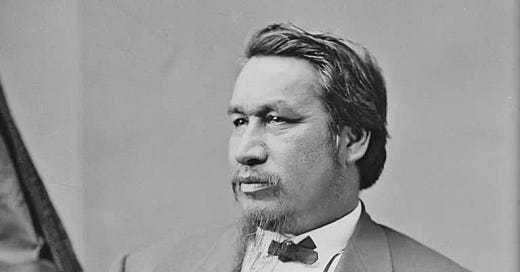The guns had fallen silent. The air, once filled with the roars of cannons and the shouts of soldiers, now echoed only with the creak of wagon wheels and the distant chirps of birds returning after the storm. Around Appomattox Court House, the scarred land bore witness to a war that had divided a nation, torn families apart, and shattered friendships.
Inside the courthouse, an aura of mixed emotions settled over the men gathered to end the U.S. Civil War.
General Robert E. Lee, leader of the Confederate forces, looked around the room. His eyes, tired from the strain of years of warfare, took in the faces of the Union officers. Among them, he noticed one that stood out - the face of Ely Parker.
Walking over, the weight of the moment pressing upon him, General Lee extended his hand, "I am glad to see one real American here."
Ely met Robert's gaze, feeling the depth of emotion behind those words. With a handshake, he responded, "We are all Americans."
For a moment, time seemed to stand still. The gravity of Ely's words hung in the air, transcending the bitter divides of the past. It wasn't just an acknowledgment of heritage but a statement of unity, of hope for a nation to mend its wounds. For Ely, it represented his way of being. Togetherness.
Born in 1828 near the Tonawanda Reservation in western New York, Ely Samuel Parker spent his childhood surrounded by nature’s splendor. Expansive forests of towering trees and the gentle babble of nearby creeks were the backdrop to his early years. But the times of play and serenity were accompanied by a heavy responsibility. As the son of a distinguished Seneca Native American tribal chief, Ely was seen as a future leader for his people.
Keep reading with a 7-day free trial
Subscribe to Historical Snapshots to keep reading this post and get 7 days of free access to the full post archives.




